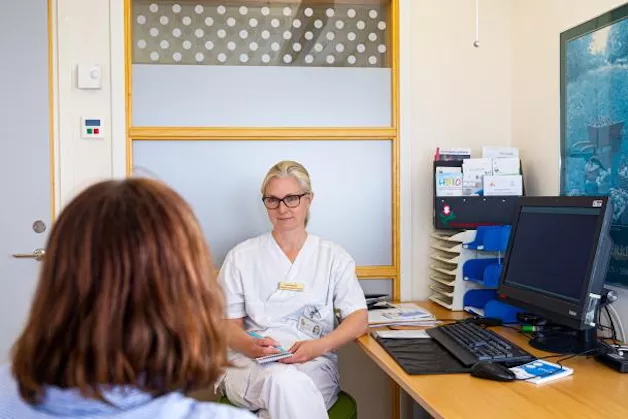Meet our researchers: Huntington’s disease – a fascinating mystery
Those who carry the mutated gene will develop the fatal Huntington’s disease at some stage in life. The brain disease, which can be inherited across generations, begins slowly and makes it increasingly difficult for sufferes to regulate their feelings, thoughts, and eventually movements. There is still no treatment. However, Huntington researcher and psychiatrist Åsa Petersén is working hard at it.
“As a doctor, I feel despair when I see my patients decline without being able to slow down the development. However, it also provides me with strong motivation to keep working”, she says.
We meet at one of her two workplaces, the Huntington unit, Neurology Clinic at Skåne University Hospital in Lund, high up in the main hospital building. A misty view of the rapeseed fields, all the way to the sea, beautiful, blue. This is where she meets with those suffering from the disease and their families.
“In my work, I am driven by the needs I see when meeting the families affected. It is clear that the mental symptoms, which come first, are the ones that are most difficult for the affected individual and their loved ones to manage. It makes it simply self-evident that further research is required to really be able to have an effect on quality of life and survival.”
Translational research
Therefore, she conducts translational research. This means that Åsa brings with her questions from the clinic where she meets with her patients, to the research, i.e. to the laboratory for further study. The laboratory is a stone’s throw away, at the Biomedical Centre (BMC) at Lund University, her other workplace. The aim of the approach is to bring the new knowledge back to the patients at the clinic. The research process is a cycle, with the patient at the centre.
At the clinic, it is clear that the mental symptoms often come first. They include changes in social interaction, irritability, depression, difficulties taking initiative. It is not known how these changes occur or which brain regions they originate from.
Åsa’s research has already shown that the mental symptoms come from the Huntington gene’s impact on the brain and are part of the disease just as the more recognised impact on movement.
Gripping Mystery
Åsa knew as far back as in upper secondary school that she wanted to become a researcher and doctor. To discover and develop that which becomes new knowledge is attractive. An inspiring lecture by Professor Patrik Brundin in semester 3 of the medical programme sparked Åsa’s major interest.
“The disease was like a fascinating and gripping mystery. With a single gene alteration as an explanation and with consequences for the regulation of movement, thoughts and feelings, it should be possible to work out how the disease occurs and how to slow it down. A few months after the lecture, I was given the opportunity to start researching it in Patrik Brundin’s research team. Since then, I have been hooked – that was 23 years ago!”
"In my work, I am driven by the needs I see when meeting the families affected."
Within Huntington research, there has previously been a big focus on the typical motor disturbances and their link to the effect on one of the brain’s regions for motor control, the basal ganglia. Researchers now know that the mental symptoms often emerge up to 15 to 20 years before the effects on movements are visible. Åsa’s hypothesis is that the early mental symptoms come from changes in the brain’s hormonal centre, the hypothalamus, which controls the regulation of feelings.
Lives hang on the research progress
Research has shown that the changes in the hypothalamus occur at an early stage and that there is a link to early disease symptoms.
“We want to show which specific neuron paths in the hypothalamus are affected and how they lead to the development of cognitive symptoms. We are also researching whether the hypothalamus network could be a focus point for therapies.”
“I hope my research will increase the understanding of the cognitive symptoms of Huntington’s disease and that I will be able to contribute to the development of therapies against mental symptoms and to slow down the development of the disease itself. To research, find new knowledge, really gives work and life meaning. It is also essential in order to develop care and treatment within healthcare and highlights the urgency for us as researchers in making significant progress. People’s lives and quality of life are dependent on it.”
Text and photo: Agata Garpenlind
Facts/Translational research
From the latin translatio=transfer, is a school of medical research that is based on a problem discovered in healthcare, e.g. during diagnosis or ongoing treatment that is used in development and research prior to clinical trials. The research is based on a patient’s health status and has the aim to quickly achieve results that can lead to a better diagnosis and therapy for the patient. The work method is not new, however, the term first started to be used in the 2000s.
Facts/Huntington’s disease
Hereditary genetic brain disease that results in a disturbed function of the neurons in the brain. It is sometimes called Huntington’s chorea, as part of the symptoms consist of involuntary movements. The disease got its name from the American doctor who described it in the 1800s. There are approximately 1000 people with Huntington’s disease in Sweden.
The disease is due to a mutation in the Huntington gene. If an individual carries the mutation, they will develop the disease at some stage in life. This is well known. The risk of inheriting it for a child of a parent who has the mutation, and thus developing the disease themselves, is 50 per cent. The disease begins slowly at some point in life. It leads to difficulties in regulation of emotions, thoughts and movements. The individual progressively deteriorates. Approximately 20 years after the movement disorders begin, the patient dies.
Åsa Petersén
Name and occupation: Åsa Petersén, professor of neuroscience and consultant in psychiatry, leads the Huntington Centre at Lund University and was recently named a Wallenberg Clinical Scholar 2020, and awarded SEK 15 million in research funding over five years to find methods that can slow the development of Huntington’s disease.
Age: 45
Family: husband and two children.
Lives: in Lund and in Österlen.
In her free time: spending time with the family, exercising.
Qualifications: Medical degree and PhD from Lund University
Occupational background: worked as a medical intern at Blekinge Hospital in Karlshamn and resident physician in psychiatry at the Psychiatric Clinic in Lund. Has held positions as research fellow, researcher and senior lecturer at Lund University.
How did you end up at Lund University? I started studying on the medical programme in 1994 and have been here ever since.
Time at the Department of Experimental Science? Since 1997.
Research area: Neuroscience and psychiatry
Your most important moment in research? When we, with genetic manipulations could show causation between the mutated Huntington gene in the hypothalamus and the development of depression and metabolic impact. To be able to demonstrate causation is always significant.
The most important insight you have had while researching? How much hard work and how many failures are required for each step forward.
What is your superpower? I probably have quite a bit of grit (coined by psychologist Angela Duckworth), a combination of passion, inner drive and perseverance.
Infomation about Åsa Petersén in the Lund University Research Portal


